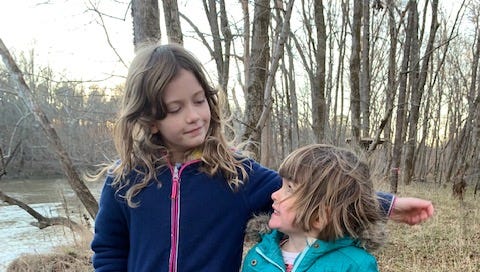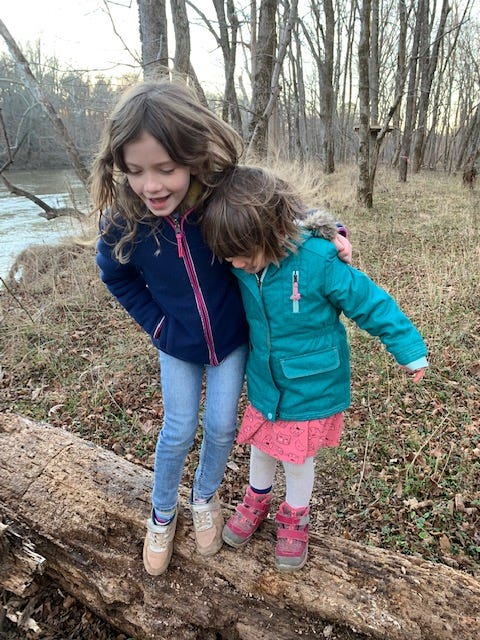A few years ago, Beatrice and I were with having lunch with some friends at a museum’s outdoor park, and my friend’s daughter was really afraid of something—bees, maybe? I can’t remember the exact set of circumstances, but I do remember the calm way my friend reassured her child as we moved to another table. “My number one job is keeping you safe,” she said. The distraught child stopped crying, and I remember feeling so impressed by the sincere automaticity of my friend’s purpose and priority.
It stuck with me, and I’ve said the same thing many times since—usually when explaining to Bea and Harriet why they can’t do something dangerous. It’s helpful to remember what your bottom line, number one job is. Keeping everybody safe.
It’s common now to end emails or other communication with “stay safe!” because… what else is there to say? I say it here: stay safe, Frog Troublers! I know we’re vaccinated and boosted and wearing our masks and being as careful as we can, but as the Omicron surge has gotten worse, it feels like the walls are closing in. This week Bea wasn’t feeling well on Friday, so we kept her home. Harriet went to school, and at around 11:30 we got an email telling us that someone in her classroom had tested positive. Did we want Harriet tested? Yes, we said, and Richard took Bea to get a PCR test at UNC Hospital that day. Both of their tests came back negative, but who knows what next week will bring.
Because next week is also the first week back on campus at local universities, including mine, which is full-steam-ahead with in-person learning as of this writing, despire staffing shortages caused by the virus and the lack of a vaccine mandate—or even a mandate that people wear more effective KN95 maks, as they do at large companies. This week, NC Policy Watch reported that internal projectionss at UNC-Chapel Hill have estimated that, under current in-person condition, they’ll see between 850 and 1650 positive cases per day when this variant peaks, likely three weeks from now. That’s just at UNC-Chapel Hill. NC State, where I teach, has more students and a lower vaccination rate—but we’re in person too, and starting back tomorrow.
Are we really going back? On Monday? my colleagues and students keep asking. They’re waiting for leadership on campus to do what seems safest, taking classes online (which can be done very effectively) for two or three weeks to slow the spread of Omicron, protect our hospitals, provide relief to working parents with quarantined kids, and potentially keep thousands of students from getting sick.
It’s clear that keeping us safe is not our leaders’ number one priority. It’s hard to believe that they’re most worried about tuition or housing money, because we’re not talking about an entire semester online—we’re talking about a temporary shift that would ease the considerable burdens of faculty, staff, and many students. At this point, I think a shift of a few weeks would be enormously popular with students, many of whom live in homes with elderly people, young children, and frontline workers. (But has anyone asked them?)
So why aren’t we doing that? Is it money? Is it our Republican-controlled legislature, which cowed us into our disastrous reopening in August 2020, and which has been decidedly anti-public health, passing a law in August 2021 requiring local school boards to vote monthly on mask requirements for schools?
Or worse, is it an infection of anti-public-health thinking transmitted to many of our individual chancellors, provosts, and deans? Because there is not uniformity among the UNC System. Check out this useful Omicron response tracker from Luke Carman, a PhD student in mathematics at NC State, and you’ll notice that Fayetteville State, Elizabeth City State, UNC Asheville, and UNC Charlotte have all delayed in-person classes. NC Central is wisely requiring and providing the more protective KN95 masks for classroom use. Notice anything in that group? Fayetteville State, Elizabeth City State, and NC Central are all Historically Black Universities. As Rodney Robinson (2019 National Teacher of the Year and fellow passenger on Ms. Washington’s bus) pointed out on Twitter, “HBCUs are still leading other schools in Covid protections for their students.”
Last night NC Policy Watch reported that UNC’s Gillings School of Global Public Health has moved to online instruction for the first three weeks of class, following UNC epidemiologists’ predictions that under current conditions the school could see more that 22,000 new infections in the first month of school.
UNC is allowing individual deans to make the choice about course delivery. Gillings’s dean, Dr. Barbara Rimer, sent a message to students and faculty that read, in part:
“At Gillings, our leadership team has actively monitored this situation. We have sought and received input from faculty, staff, students, and colleagues across campus. We have been in regular contact with our infectious disease experts here at Gillings and on campus and know from them that we can expect high rates of infection this month. The safety and health of students, staff and faculty remain paramount.”
Because how can you reasonably and responsibly fulfill your mission of (in NC State’s case) being known as a “diverse, equitable and inclusive community that has a transformative impact on society and advances the greater good” if a large portion of your faculty, staff, and students are scared to come to campus, or sick with Covid because they came to class? How can you express your values of “excellence, inclusion, integrity, sustainability, community, freedom, and collaboration” if you haven’t even asked students, faculty, and staff how they feel about safety on campus?
I’m not teaching classes this semester, but tomorrow morning I’ll grab a fresh KN95 mask and head to campus to distribute more masks to our hardworking, underpaid teaching assistants. I’ve been told we don’t have enough to give to everyone (yet another reason we should delay a return to in-person—also, how is it possible that no one has planned for KN95 mask distribution?), so I’ve ordered some more on my own, including those made for smaller faces (a tight seal is really important on masks).
Unless we get a miraculous message telling us that we’re doing the right thing, and delaying in-person classes for a week (like UNC Asheville), or two weeks (like UNC Charlotte), or three weeks (like Gillings)? It’s like waiting on a snow day—except it already snowed. It has been snowing. And it’s gonna keep snowing—at least for a while.
How are you keeping your loved ones safe, Frog Troublers? If you’re teaching or studying somewhere, how safe do you feel? Where are your leaders’ priorities?
P.S. We’ll have updates next week on how the weekday vegetarianism is going. We’re digging this adaptable recipe for easy, crispy oven-baked tofu.






I am responding from self-imposed quarantine, as my adult daughter's boyfriend's father has tested positive. Although it is good that the father is not THAT sick, he was also 60 and not boosted by choice. My daughter's boyfriend, for reasons of his own, had chosen not to be boosted yet....he had an appointment next week, b/c previous appts he'd made conflicted with other things he needed or wanted to do. He, the boyfriend, spent hours at our house 2 days before his father's PCR test turned positive; Boyfriend and we sat and watched movies together, except for the moments he excused himself b/c his GI tract was upset, as was his father's, at home. Even as a physician, I was not thinking Omicron, nor was I aware at that point, that he and his parents (mom is a pharmacist) had not been boosted.
Having cared for patients dying in the ICU whose families could not be with them b/c of the threats of COVID in the hospital, having so many of my own patients experience their own deaths alone, having distraught family members begging to come into exam rooms from which they were barred--only patients themselves could come--I am reeling at the cavilierness of institutions that are opening as if we weren't in the midst of a tsunami of COVID. So many people are now admitted either directly b/c of COVID, or because of the interaction of COVID with their preexisting comorbidities; we, as a nation, have tens of millions of people living with chronic diseases. For the young, student-aged population, these often involve "only" morbid obesity, which significantly increases one's risk of contracting and dying of COVID; diabetes, early onset lung disease from smoking and basic physical deconditioning also contribute, even before you get to the list of more hard-edged chronic problems, like ongoing immunosuppression due to HIV or treatments used to avoid transplant rejections, or even chronic steroids for asthma. The number of older staff, from faculty to maintenance crews, with diseases rendering them at high risk, is astronomically higher than among the students.
What could possibly justify bringing these people together in person at this point, other than greed? Has there been some kind of administrative calculation that if there are not more than 5 or 10 unnecessary deaths during that time, the amount of money made will be worth it?
From my own land-locked position, I cannot possibly go see my own health care providers tomorrow, after recent major surgery, and risk a domino-cascade of infection among others less healthy than I am; my daughter cannot see the patients she has scheduled tomorrow, who are all over 75, until we at least know that the vector in this case--her boyfriend-- is negative by PCR. The fact that none of us would likely get ill enough to require hospitalization doesn't mean than none of the people with whom we interact might not be. Likewise, NCSU reporting in a month or two that there were few or no student deaths in no way measures the ripple effect of a concentration of COVID infections on campus; how many shop owners, grandparents, faculty and staff or their families will have fallen ill or died?
We have sufficient data to understand that the current wave should pass over us within a month; hospitals will be better able to handle individual cases; fewer people will die if we once again flatten the curve. NCSU needs to act responsibly to its students, its faculty and staff and to the greater community--the state at large--and NOT be part of the problem. Education can happen on line for an additional three weeks or so to prevent predictable and unnecessary deaths. We cannot reverse decisions after the fact to bring people back to life.
.